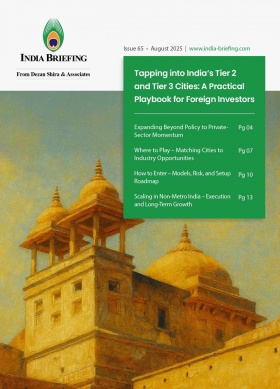India Expands Fast-Track Merger Framework: What It Means for Investors
India has expanded the scope for fast-track of mergers with the Corporate Affairs ministry releasing a notification on September 4 raising the debt limit for unlisted firms to INR 2 billion and easing M&A approvals outside the NCLT to support growth-stage companies.
India’s Ministry of Corporate Affairs (MCA) has expanded the scope of fast-track mergers under the Companies Act, 2013, significantly easing compliance for select corporate combinations. The move is designed to accelerate corporate restructuring, unclog judicial bottlenecks, and create a more predictable environment for foreign and domestic investors.
India extends fast-track mechanism for mergers: What has changed
The MCA, through its September 4 notification, amended the Companies (Compromises, Arrangements, and Amalgamations) Rules, 2025. The revision broadens eligibility for fast-track mergers – those that can proceed without the lengthy approval of the National Company Law Tribunal (NCLT).
Previously, only small companies, startups, and mergers between a holding company and its wholly owned subsidiary qualified. The new framework allows:
- Holding–subsidiary mergers even if the subsidiary is not wholly owned.
- Mergers between subsidiaries of the same holding company (if the transferor is unlisted).
- Mergers of unlisted companies with outstanding debt under INR 2 billion and no defaults on loans, debentures, or deposits.
- Foreign holding companies merging with Indian wholly owned subsidiaries.
In addition, Rule 25 now applies to schemes of division or transfer of undertakings, extending relief beyond conventional mergers.
Why this matters
For investors, the reforms tackle one of the biggest challenges in India’s corporate landscape: time-consuming merger approvals. Traditional NCLT processes can stretch for months, even years, especially when multiple regulators are involved.
With the widened fast-track route, companies with limited external stakeholders or low debt exposure can restructure more swiftly. This aligns with Finance Minister Nirmala Sitharaman’s 2025 Budget promise to rationalize merger approvals and supports India’s push to improve ease of doing business.
As of November 30, 2024, MCA data showed 309 merger applications were pending before the NCLT, alongside 53 fast-track applications still awaiting clearance. By diverting simpler cases from the Tribunal, the government hopes to reduce these backlogs significantly.
Advisory firms expect the changes to be transformative. Approval of schemes of arrangement through the NCLT, and in the case of listed firms also via stock exchanges and SEBI, often drags on for months – far removed from business realities. The new notification is expected to ease this pain point.
By lifting the debt threshold for unlisted firms to INR 20 billion – quadruple the INR 500 million proposed in draft rules – the MCA has signaled a pragmatic approach that recognizes the financing needs of growth-stage companies.
Compliance safeguards
While simplifying mergers, the rules also add checks and balances:
- An auditor’s certificate (Form CAA-10A) must confirm no loan or deposit defaults within 30 days prior to notice or filing.
- Registered valuers’ reports (Form CAA.11) must be submitted with the Central Government.
- Regulators such as RBI, SEBI, IRDAI, and PFRDA must be notified when sectoral firms are involved.
- Listed companies must submit schemes to stock exchanges for comments.
These guardrails aim to preserve creditor and minority shareholder rights while ensuring transparency.
Implications for foreign investors
For multinational firms eyeing India, the expanded fast-track framework presents clear advantages:
- Simpler integration of Indian subsidiaries with parent or group companies, reducing delays in post-acquisition restructuring.
- Easier consolidation of unlisted portfolio firms with modest debt profiles, particularly relevant for private equity investors.
- Streamlined cross-border group restructuring, especially where foreign holding companies operate through Indian subsidiaries.
The reform also signals India’s commitment to aligning regulatory processes with business timelines – a crucial factor for investors seeking predictability.
Our take
India’s corporate law reforms signal a decisive shift from procedure to performance. By widening the scope of fast-track mergers, the MCA hopes to reduce friction in M&A transactions and enabled quicker capital deployment – critical for investors managing time-sensitive opportunities.
Coupled with a high-growth economy and liberalized FDI policies, these changes strengthen India’s position as a premier investment hub in Asia. The reform is also timely: as geopolitical realignments and rapid technological change reshape global value chains, international firms are diversifying footprints while Indian companies increasingly seek global expertise and external capital.
About Us
India Briefing is one of five regional publications under the Asia Briefing brand. It is supported by Dezan Shira & Associates, a pan-Asia, multi-disciplinary professional services firm that assists foreign investors throughout Asia, including through offices in Delhi, Mumbai, and Bengaluru in India. Dezan Shira & Associates also maintains offices or has alliance partners assisting foreign investors in China, Hong Kong SAR, Vietnam, Indonesia, Singapore, Malaysia, Mongolia, Dubai (UAE), Japan, South Korea, Nepal, The Philippines, Sri Lanka, Thailand, Italy, Germany, Bangladesh, Australia, United States, and United Kingdom and Ireland.
For a complimentary subscription to India Briefing’s content products, please click here. For support with establishing a business in India or for assistance in analyzing and entering markets, please contact the firm at india@dezshira.com or visit our website at www.dezshira.com.
- Previous Article Why the Middle East is Emerging as a Top Destination for Indian Outbound Investment
- Next Article How Indian Businesses Can Set Up in the UAE (2025 Guide)












